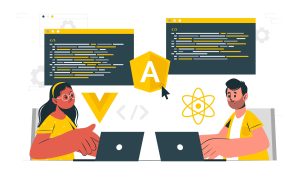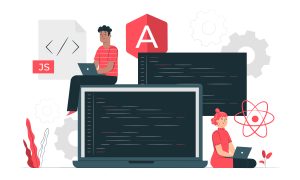A New Wave in Application Development
Picture this: You have an amazing idea for an app that could potentially transform how businesses handle customer service. However, you don’t know how to code. What do you do? A few years ago, you might have had to hire a developer or spend time learning to code. Now, things have changed significantly. Thanks to Low-code / No-code development platforms, you can turn that dream into reality without having to be a coding wizard. Let’s explore how low-code and no-code platforms are transforming the way applications are developed.
What Are Low-Code and No-Code Platforms?
Before we dive into the impact of these platforms, it’s crucial to define what they are. Low-code platforms require some coding but drastically reduce the amount of manual coding needed. They offer visual interfaces with pre-built components, speeding up the development process.
On the other hand, no-code platforms are designed for people who don’t know how to code at all. These platforms rely entirely on visual interfaces and drag-and-drop features. One example is Fliplet, a no-code app builder that enables you to rapidly create a custom app.
The Democratization of App Development
Who Can Create Apps Now?
The most significant impact of low-code / no-code development platforms is the democratization of application development. With these tools, you don’t need specialized skills to bring an idea to life. That opens the door for people who don’t have a background in tech but do have innovative ideas.
Speeding Up the Process
Because these platforms minimize the complexity of coding, development cycles are shorter. Teams can now push out apps in a fraction of the time it used to take. This speed allows businesses to adapt to market changes more quickly, offering an essential edge in competitive markets.
The Financial Benefits
Cost-Effective Development
Utilizing low-code and no-code platforms can lead to significant cost savings. The reduced time in development translates into fewer work hours, which in turn means less expenditure on labor. Moreover, because you don’t need highly specialized developers, the overall cost of developing an app drops.
Lower Maintenance Costs
Since these platforms are built to be user-friendly and often come with strong support communities, maintaining the app also becomes less expensive. Even if changes are needed, they can be made quickly and without significant costs.
Improving Accessibility and Inclusivity
Breaking Down Barriers
Traditionally, the app development world was limited to those who had the time, resources, and education to learn complex coding languages. Low-code / No-code development platforms have broken down these barriers, allowing a more diverse range of people to contribute to technological innovation.
Solving Local Problems
Another perspective to consider is how these platforms enable people to solve local problems with tailored solutions. A small business owner in a rural area, for instance, can create an app that addresses specific community needs without the need for an extensive budget or specialized skill set.
Adaptability and Flexibility
The Power to Pivot
If recent world events have taught us anything, it’s the importance of being able to adapt. Low-code and no-code platforms offer the flexibility to pivot your application’s functionality quickly. For example, a restaurant forced to close its dine-in services could rapidly develop an online ordering app.
Continuous Improvement
These platforms also make it easier to continuously update and improve your app. The ability to quickly make changes lets you adapt to user feedback in real time, something that could take much longer with traditional development methods.
Concerns and Criticisms
Limitations in Complexity
It’s important to acknowledge that low-code and no-code platforms have limitations. They may not be suitable for highly complex applications requiring specialized features that can’t be covered by pre-built modules.
Security Concerns
As with any development tool, low-code and no-code platforms can come with security concerns. While these platforms are improving their security features, it’s essential to be aware of the risks involved and investigate the security features offered by the platform you are considering.
Conclusion: A Paradigm Shift in Application Development
Low-code / No-code development platforms are shifting the tectonic plates of the app development world. They’re democratizing the field, making it easier, faster, and more cost-effective to develop apps. While they do have limitations, the benefits often outweigh the drawbacks. One thing is clear: these platforms are not just a trend but a significant shift that is making application development accessible to a broader audience.



































































